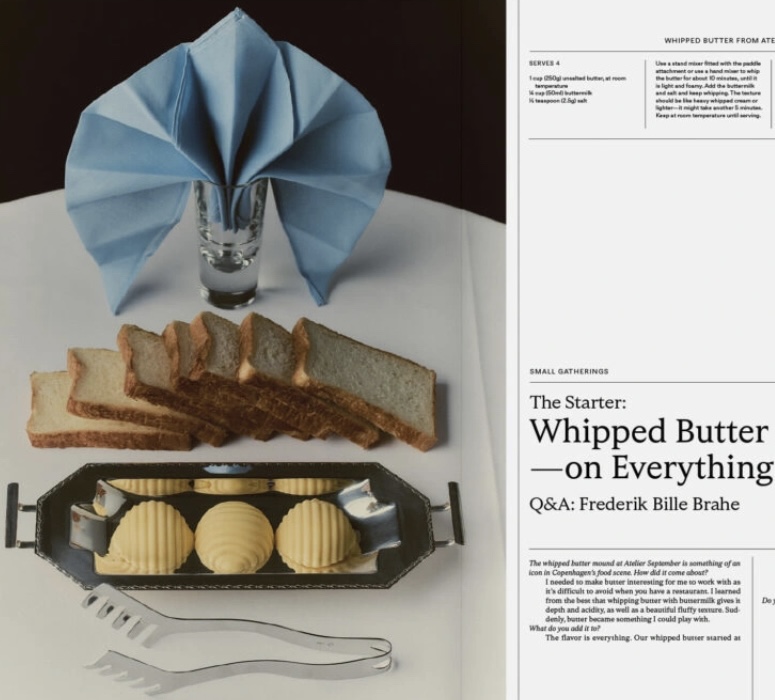Frederik Bille Brahe is a renowned Danish chef celebrated for his innovative approach to cuisine, seamlessly blending culinary arts with design and culture. His establishments, such as Atelier September and Apollo Bar in Copenhagen, exemplify his philosophy of creating spaces where food, art, and community intersect.
Atelier September: A Place for Daytime Cooking
Atelier September, located in the heart of Copenhagen, began as a brocante shop before transforming into a daytime eatery under Brahe’s vision. The restaurant emphasizes simplicity and quality, focusing on fresh, seasonal ingredients. Brahe’s approach to cooking at Atelier September is deeply personal, often drawing from memories and sensory experiences. For instance, he recalls childhood moments in his father’s garden, eating fennel and associating its taste with licorice, highlighting how personal history influences his culinary creations.
In 2020, Brahe published “Atelier September: A Place for Daytime Cooking,” a cookbook that encapsulates the essence of the restaurant. The book features 86 recipes focusing on fresh, seasonal ingredients, encouraging readers to view cooking and sharing food as daily rituals that foster connection and joy.
Apollo Bar: Blurring the Lines Between Art and Dining
Situated in a scenic courtyard near Nyhavn, Apollo Bar underwent a metamorphosis under Brahe’s leadership, shifting its focus to dinner and redesigning the space to blur the lines between art, design, and dining. Together with executive chef Yuta Kurahashi, Brahe crafts multi-course evening menus that unite the comfort of home cooking with the refinement of haute cuisine. The season-driven artistic touch is evident, with dishes like crispy panisse with fried sage and aioli, mushroom toast with Vin Jaune sauce, and celeriac noodles with almond cream and beurre noisette.
Kafeteria: A Democratic Approach to Museum Dining
In collaboration with artist Danh Vo, Brahe opened Kafeteria inside the National Gallery of Denmark (SMK). This venture aims to democratize museum dining by offering reasonably priced, organic dishes that emphasize simplicity and quality. The menu is based on seasonal and local produce, with a firm ambition to be 100% organic. The restaurant also features its own bakery, providing a selection of homemade cakes and freshly baked bread.
Sofi Bakery: Reviving Traditional Baking in Berlin
Expanding his culinary footprint beyond Denmark, Brahe co-founded Sofi Bakery in Berlin’s Mitte district. The bakery focuses on traditional craft baking methods, using ancient grains and natural fermentation processes. By sourcing high-quality, freshly milled flour and employing techniques like adding rye biga to croissant dough, Sofi Bakery aims to produce bread and pastries with depth and complexity. Brahe’s vision for Sofi includes fostering a bakery scene in Berlin that emphasizes quality and tradition.
Culinary Philosophy and Influence
Brahe’s culinary philosophy is deeply rooted in personal experiences and a respect for simplicity. He believes in the importance of quality ingredients and the sensory experiences they evoke. For example, he associates the smell of sage with memories of his father and grandfather, highlighting how sensory experiences influence his cooking. Brahe also emphasizes the significance of limitations in fostering creativity, as seen in the development of Atelier September, where constraints led to unique offerings like high-quality teas and simple, yet refined dishes.
Integration of Art and Design
Beyond the kitchen, Brahe integrates art and design into his establishments, creating environments that enhance the dining experience. At Kafeteria, the collaboration with Danh Vo resulted in a space featuring Noguchi lamps and open-source furniture by Enzo Mari, blending 1970s craft with contemporary aesthetics. This thoughtful integration of design elements reflects Brahe’s belief in creating spaces that are not only about food but also about the overall experience and atmosphere.
Community and Cultue
Brahe’s ventures often serve as cultural hubs, bringing together diverse groups of people. His establishments are known for their inclusive atmospheres, where artists, locals, and visitors converge. By creating spaces that encourage interaction and community, Brahe contributes to the cultural fabric of the cities he operates in, fostering connections through shared culinary experiences.
Impression
Frederik Bille Brahe’s approach to cuisine transcends traditional dining, intertwining food with art, design, and community. His establishments reflect a philosophy that values simplicity, quality, and the sensory experiences that food can evoke. By creating spaces that are both aesthetically pleasing and culinarily satisfying, Brahe has made a significant impact on the dining culture in Copenhagen and beyond.
No comments yet.








